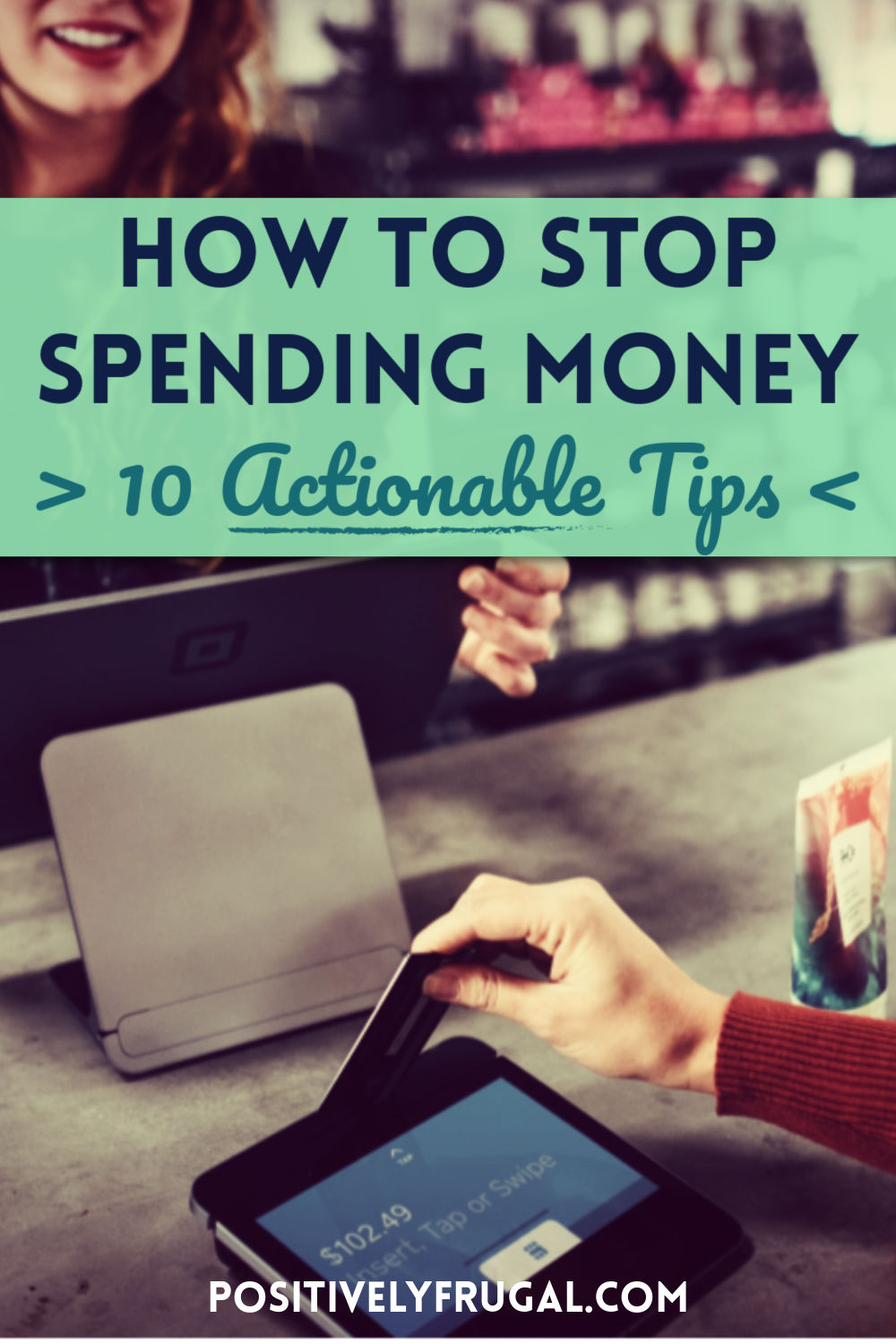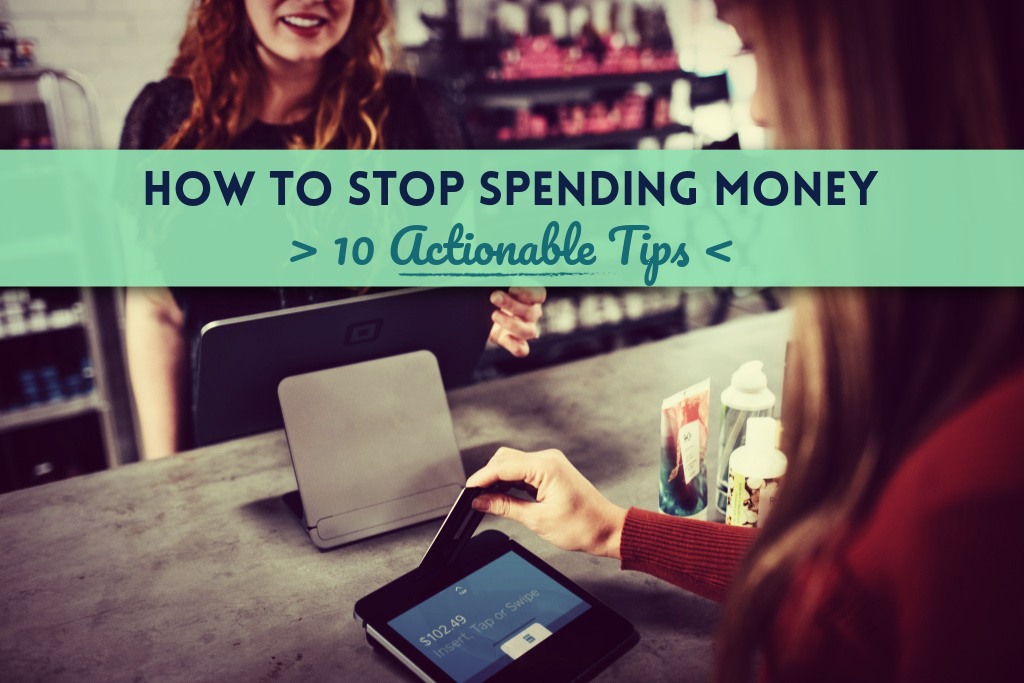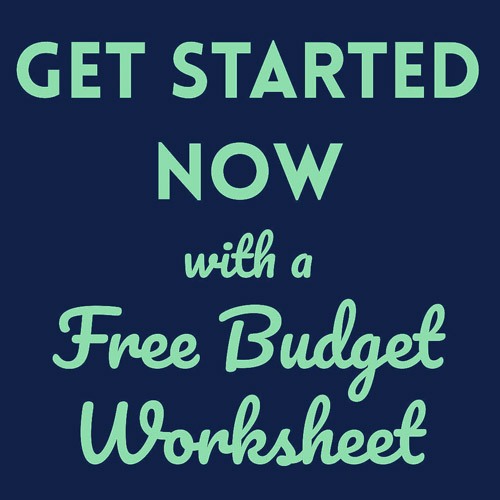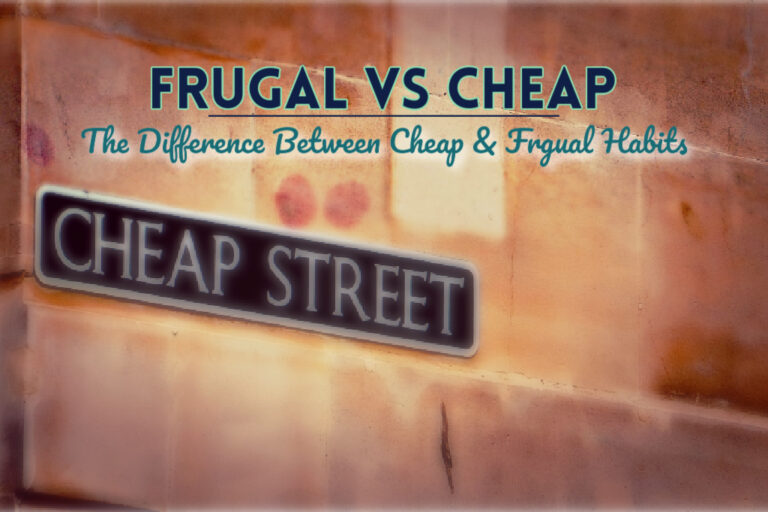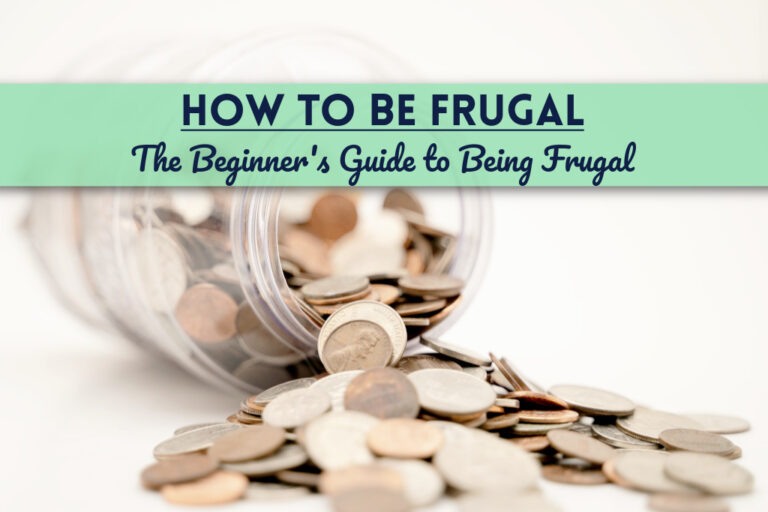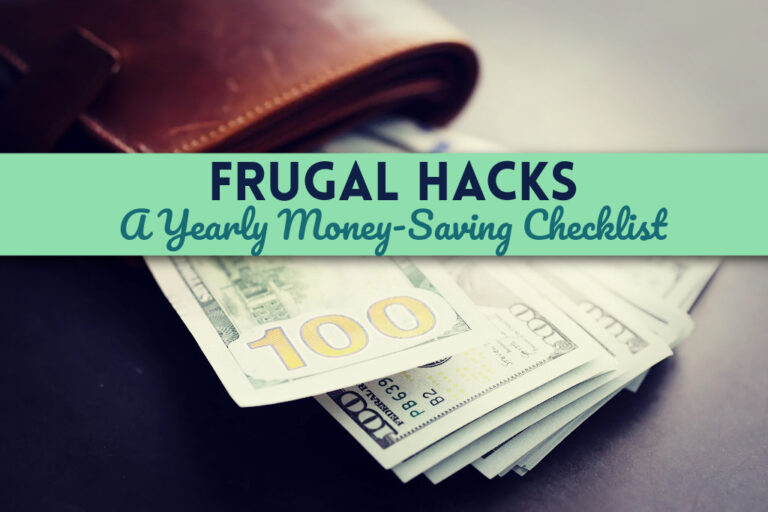Spending money is easy. So easy. A few weekday lunches out, a trip to Target and a 25-percent-off sale at your favorite online store and – poof! – your money is spent.
If you are trying to save money, get ahead or build a life of financial independence, then learning how to stop spending money is essential! My top tips to stop spending money will put you one step in the right direction.
Why We Spend Money
Spending money is a part of life…because, of course, living isn’t free. We have to spend money on necessities – like housing, food, transportation and clothes.
But let’s be honest. We often spend more money on those things than we need to – and that is not all we are spending money on.
Advertisers have figured out how our brains work. At every turn, we are bombarded with new things to buy – at the store, on social media, in entertainment. We are susceptible to their sly tricks and lured in by their slick marketing efforts.
It’s not just the advertisers; we talk ourselves into spending money. It’s something we need, something we want. Then, when we spend unnecessary money, any twinge of guilt is placated by rationalizing our expenditures.
People spend money – beyond the necessities – for a variety of reasons. Status, acceptance, convenience and gratification are a few of the most common spending triggers.
Pinpointing why we spend money can help curb the habit – but if you want a concrete answer to the burning question, How do I stop spending money?, then my tips for how to keep from spending money will help you get started.
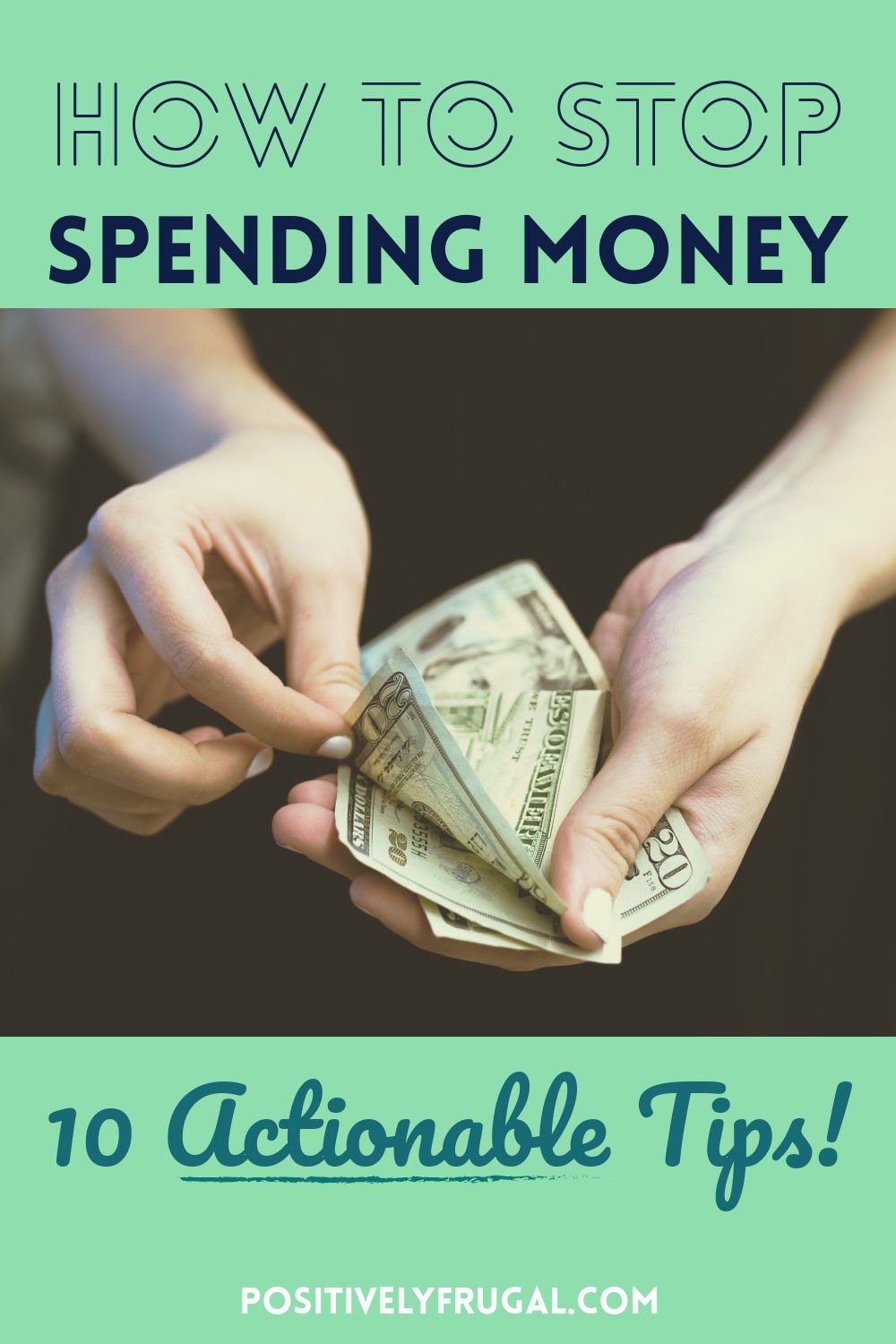
Why Spending Too Much Money Doesn’t Pay Off
Going out to eat a few times a week and dropping $50 every time you walk into a store might not seem like a big deal – but all of those little expenditures add up to big bucks.
Overspending, frivolous spending and – worst of all – spending money you don’t have are all obstacles to developing a healthy relationship with money.
When we lose control of our spending habits, we relinquish our power. Rather than controlling our money, it starts controlling us. Instead of getting ahead, we start falling behind.
When we learn how to stop spending money and save, we are in control.
How I Stopped Spending Money and Started Saving
In my quest to live a frugal lifestyle, I knew that over spending money was not going to help me achieve the life I wanted.
I didn’t have an addiction to spending money, but I was not conscious of my spending habits. Certainly, I was not being frugal. I spent and saved in a haphazard manner. Which, let’s face it, is less than ideal.
My first step to learning how to avoid spending money on unnecessary things and start saving was to take a good hard look at my money trail. It was absolutely eye opening. With a clear view of where I was – and where I wanted to be – I was able to quit spending money on things that didn’t matter.
By not spending money, I could start saving money (and who doesn’t want to save more money?!).
Now, I’m sharing my frugal hacks and best tips on how to stop spending money and start saving so that you can do it, too!

How To Stop Spending Money: 10 Actionable Tips
Learning how to stop spending money on unnecessary things might feel like a daunting task – but it doesn’t have to be! With my top 10 tips for not spending money, you can regain control over your spending habits.
#1 Create a Budget
One of the best ways to start spending money wisely – and to stop spending money frivolously – is to create a personal budget.
Creating a budget allows you to have a clear overview of your money situation. You can see what money is coming in, what is going out and where it is going.
The best part about budgeting is that you get to dictate where each dollar you earn is spent. By putting a monthly budget into place, you can stop yourself from spending money uncontrollably and start spending with intention.
If you have never created a budget before, then start with my tips on How To Make a Monthly Budget. I break down the process into three easy steps.
When you are ready to get started on making a budget, grab my printable budget worksheet for FREE – and get to it!
#2 Track Your Spending
Another great way to learn how to stop wasting money is to start tracking your expenditures. Honestly, when I started tracking money spent, it was a revelation.
I spend how much on eating out? There is no way I spend that much on clothes!
Yet, there it was in black and white. The digits don’t lie – and they are really good at pointing out blind spots.
When you get into the habit of tracking every cent you spend, you attain a higher awareness of your spending habits. In fact, tracking your spending is an essential key to organizing your finances.
Simply knowing that you have to account for your expenditures will help you think twice about spending money and you will learn how to spend money wisely. How can I track my spending easily? Consider using one of these Apps to Track Expenditures!
#3 Set Savings Goals
One way to curtail spending lots of money is to set positive savings goals.
When you are dedicated to reaching a big money goal, you are a lot less likely to be reaching for your wallet to spend unnecessarily.
By setting goals, you shift your focus from the here-and-now and turn your attention to the goals you want to achieve. Goals give you purpose in your spending (and, more importantly, your savings!).
It is best to set both short-term and long-term financial goals that will keep you motivated. A good short-term finance goal is creating an Emergency Fund; a lofty long-term goal would be to become 100% debt free.
If you are new to setting goals or are feeling intimidated by the process, start by using my tips for Setting Financial Goals.
Already have goals? Fantastic! Stay motivated with my tips for success.
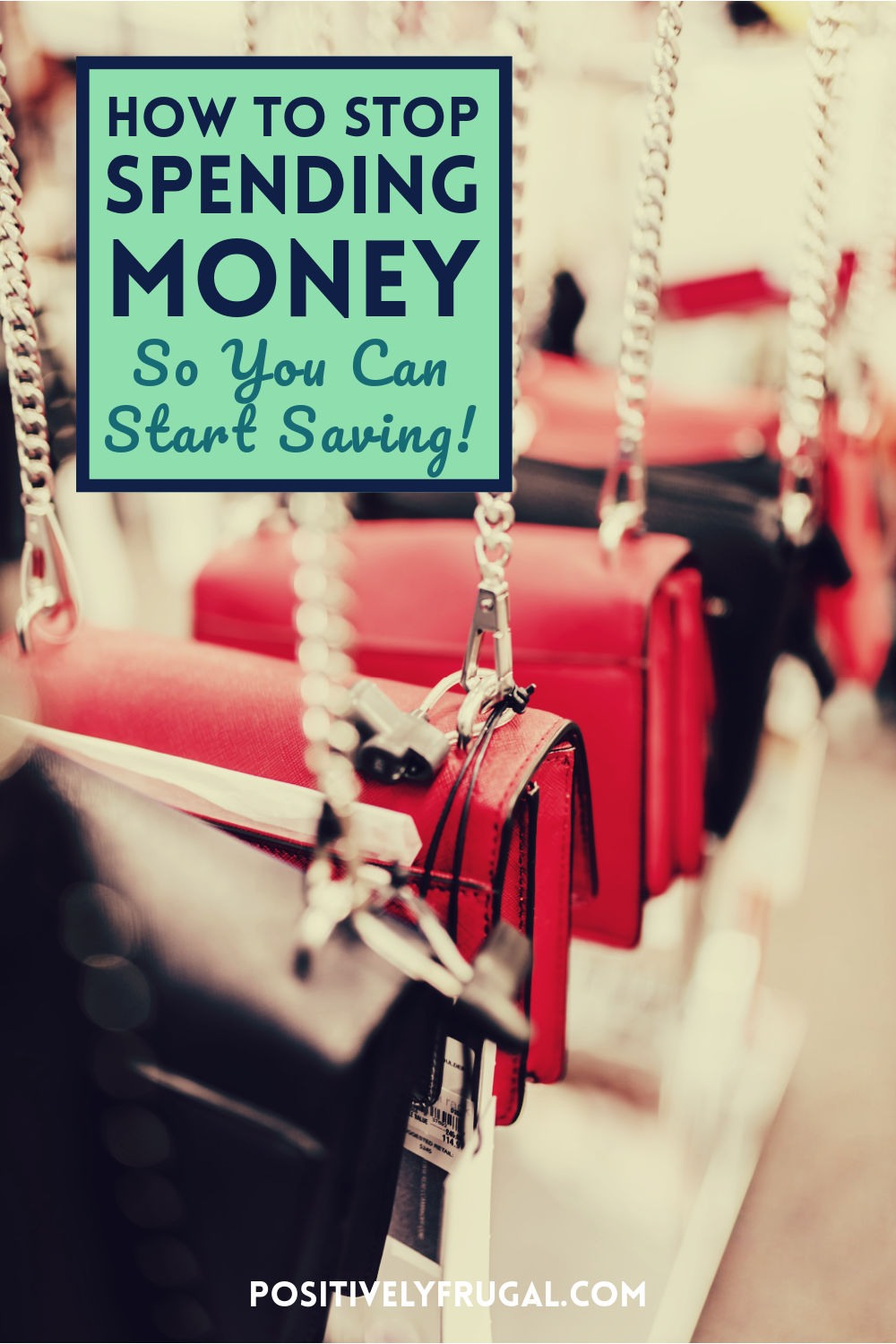
#4 Shop with a List
Impulse buys are one of the top ways we let money slip through our fingers. We go into the store to buy one thing and leave with two full bags and a much lighter wallet.
Fear not; there is a way to stop impulse spending! The cure is making a simple list. In fact, making a list is my Number One tip for buying Groceries on a Budget.
Before going shopping or stepping foot into a store, write down a list of what you need to buy.
When you enter the store, with your list in hand, resist all temptation and do not deviate from the list. Say it again: Do Not Deviate From The List.
Make that your mantra as you swiftly walk down the aisles to collect only the items on your list. You will be amazed at how much less you will spend!
#5 Only Use Cash
Using only cash is one of the top tips for how to stop overspending. There are two reasons the cash-only method reduces your appetite for spending money.
First, you likely have a finite amount of cash on hand. If you make all of your purchases using cash, you are limited to money you actually have.
The second reason using a cash-only system works for controlling spending is that dollars in your hand are real. It is much more difficult to let go of dollar bills than it is to swipe a debit card or credit card.
While using cash alone can help you learn how to control spending money, you can take it a step further and use Cash Envelopes to more specifically impose spending rules.
How it works is that you have envelopes for each category of your spending – such as Eating Out, Entertainment, Clothes. Each month you put a certain amount of cash into each envelope to be used for that category. Once the money is spent, you self-impose a restriction on spending any more money in that category for the remainder of the month.
#6 Reduce Temptation
A tried-and-true way of how not to spend money is to reduce temptations.
Each day, we are confronted with a thousand different ways to part us from our money. The latest-and-greatest gadget, this season’s new line of clothing, a sale too good to pass up, food delivered direct to your door.
The struggle is real. And the best way to stop spending money is to eliminate the temptation.
Turn it off. Unsubscribe from retailer emails. Remove your stored credit card info from online shops (yes, even Amazon). Reroute your work drive so that you don’t pass by your favorite restaurant. Leave your money at home. Freeze your credit cards.
Do whatever it is that you need to do to remove temptation so that you stop spending so much.
#7 Stay Out of Stores
Want to know the secret for how to stop spending so much money? Stay out of stores! (And that includes online shopping, too!)
It may sound extreme to some people, but when I was determined to slash my spending, staying out of stores was my weapon of choice.
Too many Saturdays were spent aimlessly wandering around Costco, filling up my cart with things that I didn’t need. I would convince myself that I needed to go to Walmart to save 50 cents on shampoo…only to wind up spending 50 dollars on a cartload of stuff I never intended to buy.
The easiest solution I saw for how to stop spending money unnecessarily was to stop going into stores. I started new frugal weekend hobbies that didn’t include big box stores. And, guess what? I suddenly noticed a swift uptick in my bank account balance.

#8 Stop Eating Out
Managing your food expenditures is one of the best tips on spending money wisely. So, how do you stop spending so much money on food? You limit – or completely eliminate – dining out.
I know, it sounds harsh. Eating out is delicious, it’s social and oh so convenient. But it’s also expensive…about 300% more expensive than preparing your own food. Ouch!
In an effort to encourage you to stop spending money on eating out, let’s look at some real numbers. Buying a $10 lunch every workday adds up to $50 a week, or $200 in one month. That’s equal to $2400 a year. And that’s just lunch!
On the other hand, if you buy food at the grocery store and make your own lunch, your midday meal would only cost about $3. (In fact, you could actually spend less than that for the whole day – and you can learn how in my $5 Food Challenge – but let’s go with a $3 lunch for this example).
Spending just $3 on workday lunches adds up to $15 a week, or $60 a month – for a total cost of $720 a year. The difference between eating lunch out and packing your meal for a year is an astounding $1680.
Not eating out for lunch is just one example. I offer more tips for how to stop spending money on food at restaurants in my article, How To Stop Eating Out. I share all of my top tips for how to stop overspending on food on my Frugal Food page.
#9 Use Daily Affirmations
One of the positive ways for how to control spending habits is to use daily financial affirmations. Think it, speak it, believe it.
Money affirmations can be powerful in helping shape your mindset and help you to stop bad spending habits. Affirmations – like “I can conquer my financial goals” and “I control my money, it doesn’t control me” – will help keep your head in the game and stop you from spending unnecessary money.
Don’t just keep these affirmations in your head. Write them down. Sticky note them on your computer. Slip a note into your wallet. Wrap it around your credit card. Get all my top tips in my article 50 Positive Financial Affirmations!
#10 Challenge Yourself to a No Spend
I love money spending games – and a No Spending Money Challenge is one of the best to help you stop overspending money.
The point of taking on a No Spend Challenge is to bring awareness to your spending habits and provide motivation for you to succeed in decreasing your spending.
You decide how to challenge yourself. You can start with a No Spend Week (or even a day!) or you can go big with a No Spend Month. It is also up to you to determine what expenditures you will eliminate. You can decide to stop buying specific items – like coffee from the coffeeshop – or you can wipe out all spending except for the essentials (rent, utilities, gasoline, medications).
Want to learn how to stop spending money on clothes? Challenge yourself to a No Spend on New Clothes for a Month (or a year!). Make do with what you have, exchange clothes with friends – but challenge yourself to stop spending money on anything new for your specified timeframe.
No Spend challenges are just one fun way to stop spending and start saving; you can find more games in my articles on Savings Games and I share tips on Free Fitness Choices, too!
BONUS: Find Fun Things To Do without Spending Money
Hands down, one of the best ways to stop spending money is to occupy your time with free things to do. Since you won’t be shopping, you need to find an activity to fill the void – and it’s best to fill that void with something that doesn’t cost.
In our consumer-minded society, finding places to go without spending money might seem like a monumental task, but I can assure you there are plenty of ways to entertain yourself for free! You can start by using my massive list of 98 Cheap and Free Activities!
Another surefire way to better learn how to stop spending too much money while also filling in the space of not shopping is to gain a financial education – and you can do it for free! Simply head to your local library and pick up one of the best financial literacy books for beginners.
Interested in more of my Budget and Goal Tips? I round them all up on the Budget & Goals page!
We Want To Know: What are your tips for how to stop spending money? Share your advice in the comments!
